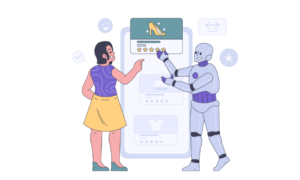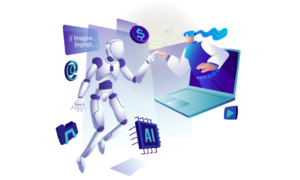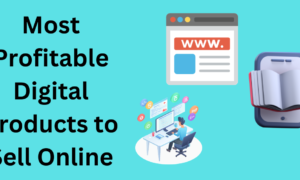The online business landscape is ever-evolving, driven by technological advancements and shifting consumer behaviors. Understanding and adapting to these changes is crucial for entrepreneurs planning to sell their businesses. Future-proofing your online business involves anticipating emerging market trends and making strategic adjustments to ensure long-term success and value.
Understanding Future-Proofing Your Online Business
Future-proofing anticipates developments and trends to ensure your business remains relevant and competitive. This concept is not new; companies must adapt to survive. However, the rapid pace of change in the digital era has made future-proofing more critical than ever. Companies that failed to adjust, such as Blockbuster, serve as cautionary tales. Conversely, those that embraced change, like Netflix, exemplify the benefits of future-proofing.
Future-Proofing Your Online Business – 9-Step Strategy
Analyzing Emerging Market Trends
You must first identify and understand emerging market trends to future-proof your online business. These trends can be technological, economic, or cultural. Technological advancements, such as artificial intelligence (AI), blockchain, and the Internet of Things (IoT), are reshaping industries. Understanding these technologies and their potential impact on your business is vital.

Moreover, consumer behavior is constantly evolving. The rise of mobile commerce, demand for personalized experiences, and preference for sustainable products are just a few examples. Keeping a pulse on these shifts allows you to align your business strategies accordingly.
Adapting to Technological Changes
Technological advancements can be both an opportunity and a challenge. Embracing AI and automation can streamline operations and enhance customer experiences. For instance, AI-driven chatbots can provide instant customer support, while automation tools can manage repetitive tasks, freeing up human resources for more strategic roles.
Blockchain technology, known for its security and transparency, revolutionizes finance, supply chain, and digital marketing. Integrating blockchain into your business can enhance security, reduce fraud, and build customer trust.
E-commerce innovations, such as augmented reality (AR) and virtual reality (VR), are transforming online shopping experiences. By adopting these technologies, businesses can offer immersive experiences, helping customers visualize products before purchase, thus reducing return rates and increasing satisfaction.
Leveraging Data Analytics
Data is the new gold in the digital age. Leveraging data analytics enables businesses to make informed, data-driven decisions. Tools like Google Analytics, Tableau, and various AI-based analytics platforms provide insights into customer behavior, market trends, and business performance.
For example, businesses can analyze customer data to identify purchasing patterns, preferences, and pain points. This information can guide product development, marketing strategies, and customer service improvements. Companies like Amazon and Netflix have set benchmarks in using data analytics to personalize user experiences and predict trends.
Enhancing Customer Experience
In the digital marketplace, customer experience is a key differentiator. Personalization strategies, such as tailored recommendations and customized marketing messages, can significantly enhance customer satisfaction and loyalty. Businesses can use AI and machine learning algorithms to deliver highly personalized experiences at scale.

Omni-channel marketing provides a seamless customer experience across multiple channels and is essential in today’s interconnected world. Whether customers interact with your brand through social media, email, or in-store, ensuring consistency and convenience can drive engagement and conversions.
It is also crucial to gather customer feedback and continuously improve based on it. Tools like surveys, reviews, and social media listening can provide valuable insights into customer needs and expectations.
Building a Resilient Business Model
A resilient business model can withstand market fluctuations and disruptions. Diversification is a key strategy for building resilience. Offering various products or services can reduce dependence on a single revenue stream. Exploring new markets and customer segments can also open up new growth opportunities.
Investing in scalable infrastructure ensures your business can grow without being constrained by operational limitations. Cloud computing, for instance, provides the flexibility to scale up or down based on demand, offering cost efficiencies and operational agility.
Agile operations, characterized by flexibility and rapid response to changes, are essential for future-proofing. Agile methodologies like Scrum or Kanban can enhance collaboration, speed decision-making, and improve adaptability.
Investing in Digital Marketing
Digital marketing is a dynamic field that requires constant adaptation. SEO and content marketing remain foundational strategies but must evolve with changing algorithms and user behaviors. Staying updated with the latest SEO trends and continuously producing high-quality, relevant content is crucial.
Social media trends are also ever-changing. Platforms like TikTok, Instagram, and LinkedIn offer unique opportunities to reach and engage with different audiences. Understanding the nuances of each platform and creating tailored content can maximize your marketing impact.
Collaborating with influencers can also amplify your reach. With their loyal followings, influencers can help you tap into new audiences and build brand credibility. Choosing the right influencers, aligned with your brand values and target audience, is key to successful collaborations.
Sustainability and Ethical Practices
Sustainability and ethical practices are becoming increasingly important to consumers. Businesses prioritizing green practices and corporate social responsibility (CSR) initiatives can build robust and loyal customer bases. Implementing sustainable practices, such as reducing waste, using renewable energy, and offering eco-friendly products, can attract environmentally conscious consumers.
Ethical consumerism, where consumers make purchasing decisions based on moral considerations, is rising. Ensuring fair labor practices, sourcing sustainable materials, and being transparent about your business practices can enhance your brand reputation and customer trust.
Preparing for Market Disruptions
Whether economic, technological, or social, market disruptions can pose significant challenges to businesses. A robust crisis management plan can mitigate the impact of such disruptions. This includes identifying potential risks, developing response strategies, and regularly reviewing and updating these plans.
Maintaining financial reserves can provide a safety net during unforeseen events. Ensuring sufficient liquidity to cover operational expenses during downturns can prevent financial strain and business closures.
Adaptive strategies, such as pivoting business models or exploring new revenue streams, can help businesses navigate disruptions. During the COVID-19 pandemic, many businesses adapted by shifting to online sales, offering virtual services, or launching new products to meet changing demands.
Legal and Regulatory Compliance
Navigating the legal and regulatory landscape is crucial for future-proofing your business. Understanding and complying with regulations, such as data privacy laws and intellectual property rights, can prevent legal issues and protect your business.
Data privacy laws, such as the General Data Protection Regulation (GDPR) and the California Consumer Privacy Act (CCPA), impose strict requirements on how businesses collect, store, and use customer data. Ensuring compliance with these laws avoids penalties and builds customer trust.
Protecting your intellectual property, including trademarks, patents, and copyrights, is essential to safeguard your innovations and brand identity. Regularly reviewing and updating your intellectual property portfolio can prevent infringements and legal disputes.
Future-Proofing Your Online Business: A Holistic Approach
Future-proofing your online business requires a holistic approach that combines multiple strategies. Continuous learning and staying abreast of industry developments can help you anticipate changes and adapt proactively. Engaging in industry networks, attending conferences, and subscribing to relevant publications can provide valuable insights.
Maintaining a competitive edge involves regularly assessing your competitors and identifying opportunities for differentiation. Offering unique value propositions, superior customer experiences, and innovative products can set your business apart in a crowded market.
Conclusion
Future-proofing your online business is essential for long-term success and value in a rapidly changing digital landscape. By understanding and adapting to emerging market trends, leveraging technological advancements, enhancing customer experiences, building a resilient business model, investing in digital marketing, prioritizing sustainability and ethical practices, preparing for market disruptions, and ensuring legal and regulatory compliance, you can create a robust foundation for your business. A holistic approach, characterized by continuous learning and proactive adaptation, will enable you to navigate the uncertainties of the future and thrive in a competitive market.
FAQs
What does future-proofing an online business mean?
Future-proofing means anticipating future developments and trends to ensure the business remains relevant, competitive, and successful in the long term.
How can data analytics help me future-proof my business?
Data analytics provides insights into customer behavior, market trends, and business performance, enabling informed decision-making and strategic adjustments.
What are some critical technological trends to watch for?
Key technological trends include artificial intelligence, blockchain, augmented reality, and virtual reality, which can potentially transform various aspects of online business.
How important is customer experience in future-proofing a business?
Customer experience is crucial as it drives satisfaction, loyalty, and engagement. Personalized experiences and omni-channel marketing are essential strategies for enhancing customer experience.
Why is sustainability important for future-proofing?
Sustainability is important as consumers increasingly prefer eco-friendly and ethical products. Implementing sustainable practices can attract environmentally conscious consumers and build brand loyalty.
How can I prepare my business for market disruptions?
Preparing for market disruptions involves having a robust crisis management plan, maintaining financial reserves, and developing adaptive strategies to navigate unforeseen challenges.



























